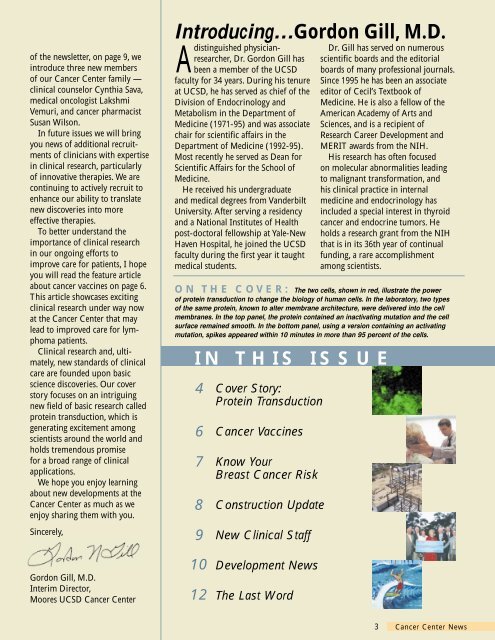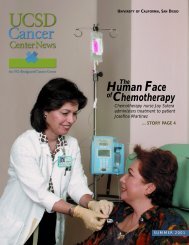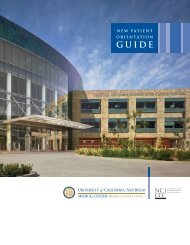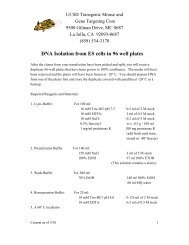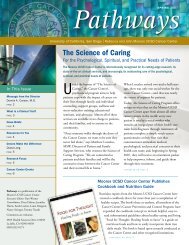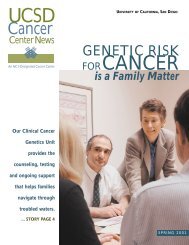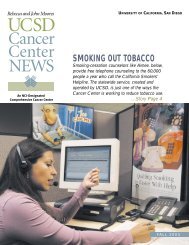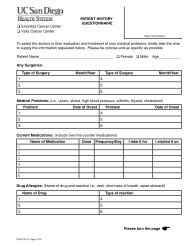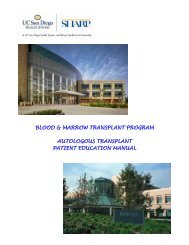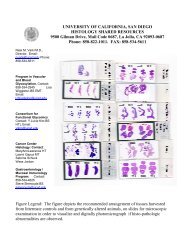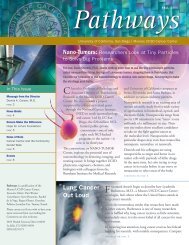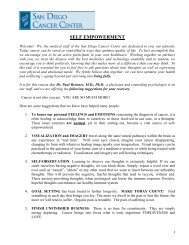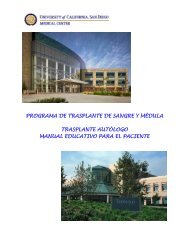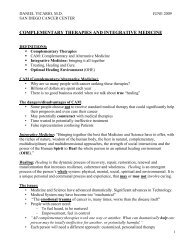PROTEIN TRANSDUCTION: - Moores Cancer Center
PROTEIN TRANSDUCTION: - Moores Cancer Center
PROTEIN TRANSDUCTION: - Moores Cancer Center
Create successful ePaper yourself
Turn your PDF publications into a flip-book with our unique Google optimized e-Paper software.
of the newsletter, on page 9, we<br />
introduce three new members<br />
of our <strong>Cancer</strong> <strong>Center</strong> family —<br />
clinical counselor Cynthia Sava,<br />
medical oncologist Lakshmi<br />
Vemuri, and cancer pharmacist<br />
Susan Wilson.<br />
In future issues we will bring<br />
you news of additional recruitments<br />
of clinicians with expertise<br />
in clinical research, particularly<br />
of innovative therapies. We are<br />
continuing to actively recruit to<br />
enhance our ability to translate<br />
new discoveries into more<br />
effective therapies.<br />
To better understand the<br />
importance of clinical research<br />
in our ongoing efforts to<br />
improve care for patients, I hope<br />
you will read the feature article<br />
about cancer vaccines on page 6.<br />
This article showcases exciting<br />
clinical research under way now<br />
at the <strong>Cancer</strong> <strong>Center</strong> that may<br />
lead to improved care for lymphoma<br />
patients.<br />
Clinical research and, ultimately,<br />
new standards of clinical<br />
care are founded upon basic<br />
science discoveries. Our cover<br />
story focuses on an intriguing<br />
new field of basic research called<br />
protein transduction, which is<br />
generating excitement among<br />
scientists around the world and<br />
holds tremendous promise<br />
for a broad range of clinical<br />
applications.<br />
We hope you enjoy learning<br />
about new developments at the<br />
<strong>Cancer</strong> <strong>Center</strong> as much as we<br />
enjoy sharing them with you.<br />
Sincerely,<br />
Gordon Gill, M.D.<br />
Interim Director,<br />
<strong>Moores</strong> UCSD <strong>Cancer</strong> <strong>Center</strong><br />
Introducing…Gordon Gill, M.D.<br />
Adistinguished physicianresearcher,<br />
Dr. Gordon Gill has<br />
been a member of the UCSD<br />
faculty for 34 years. During his tenure<br />
at UCSD, he has served as chief of the<br />
Division of Endocrinology and<br />
Metabolism in the Department of<br />
Medicine (1971-95) and was associate<br />
chair for scientific affairs in the<br />
Department of Medicine (1992-95).<br />
Most recently he served as Dean for<br />
Scientific Affairs for the School of<br />
Medicine.<br />
He received his undergraduate<br />
and medical degrees from Vanderbilt<br />
University. After serving a residency<br />
and a National Institutes of Health<br />
post-doctoral fellowship at Yale-New<br />
Haven Hospital, he joined the UCSD<br />
faculty during the first year it taught<br />
medical students.<br />
IN THIS ISSUE<br />
4 Cover Story:<br />
Protein Transduction<br />
6 <strong>Cancer</strong> Vaccines<br />
7 Know Your<br />
Breast <strong>Cancer</strong> Risk<br />
8 Construction Update<br />
9 New Clinical Staff<br />
10 Development News<br />
12 The Last Word<br />
Dr. Gill has served on numerous<br />
scientific boards and the editorial<br />
boards of many professional journals.<br />
Since 1995 he has been an associate<br />
editor of Cecil’s Textbook of<br />
Medicine. He is also a fellow of the<br />
American Academy of Arts and<br />
Sciences, and is a recipient of<br />
Research Career Development and<br />
MERIT awards from the NIH.<br />
His research has often focused<br />
on molecular abnormalities leading<br />
to malignant transformation, and<br />
his clinical practice in internal<br />
medicine and endocrinology has<br />
included a special interest in thyroid<br />
cancer and endocrine tumors. He<br />
holds a research grant from the NIH<br />
that is in its 36th year of continual<br />
funding, a rare accomplishment<br />
among scientists.<br />
ON THE COVER: The two cells, shown in red, illustrate the power<br />
of protein transduction to change the biology of human cells. In the laboratory, two types<br />
of the same protein, known to alter membrane architecture, were delivered into the cell<br />
membranes. In the top panel, the protein contained an inactivating mutation and the cell<br />
surface remained smooth. In the bottom panel, using a version containing an activating<br />
mutation, spikes appeared within 10 minutes in more than 95 percent of the cells.<br />
3<br />
<strong>Cancer</strong> <strong>Center</strong> News


